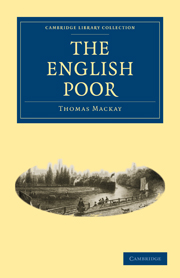Book contents
- Frontmatter
- PREFACE
- Contents
- CHAPTER I PROPERTY THE MAIN CONDITION OF SURVIVAL. THE GENERAL PROPOSITION STATED
- CHAPTER II THE SAME CONSIDERED HISTORICALLY. PRIMITIVE FORMS OF SOCIETY AND THE VILLAGE COMMUNITY
- CHAPTER III ENGLISH VILLENAGE
- CHAPTER IV THE BLACK DEATH AND THE DIVORCE OF THE LABOURER FROM THE LAND
- CHAPTER V THE INCREASE OF SHEER-FARMING, AND THE GROWTH OF A PROLETARIATE
- CHAPTER VI TOWN LIFE AND THE TRADE GILDS
- CHAPTER VII SOCIAL LEGISLATION AND THE POOR LAW
- CHAPTER VIII THE INDUSTRIAL REVOLUTION OF THE EIGHTEENTH CENTURY
- CHAPTER IX THE THEORY OF WAGES
- CHAPTER X PRIVATE PROPERTY AND POPULATION
- CHAPTER XI THE MODERN ASPECT OF THE POOR LAW
- CHAPTER XII THE POOR LAW, continued
- CHAPTER XIII INSURANCE A SUBSTITUTE FOR THE POOR LAW
- CHAPTER XIV SOME FORMS OF SOCIALISTIC LEGISLATION
- CHAPTER XV THE ETHICAL ASPECT OF THE QUESTION
CHAPTER VII - SOCIAL LEGISLATION AND THE POOR LAW
Published online by Cambridge University Press: 29 August 2010
- Frontmatter
- PREFACE
- Contents
- CHAPTER I PROPERTY THE MAIN CONDITION OF SURVIVAL. THE GENERAL PROPOSITION STATED
- CHAPTER II THE SAME CONSIDERED HISTORICALLY. PRIMITIVE FORMS OF SOCIETY AND THE VILLAGE COMMUNITY
- CHAPTER III ENGLISH VILLENAGE
- CHAPTER IV THE BLACK DEATH AND THE DIVORCE OF THE LABOURER FROM THE LAND
- CHAPTER V THE INCREASE OF SHEER-FARMING, AND THE GROWTH OF A PROLETARIATE
- CHAPTER VI TOWN LIFE AND THE TRADE GILDS
- CHAPTER VII SOCIAL LEGISLATION AND THE POOR LAW
- CHAPTER VIII THE INDUSTRIAL REVOLUTION OF THE EIGHTEENTH CENTURY
- CHAPTER IX THE THEORY OF WAGES
- CHAPTER X PRIVATE PROPERTY AND POPULATION
- CHAPTER XI THE MODERN ASPECT OF THE POOR LAW
- CHAPTER XII THE POOR LAW, continued
- CHAPTER XIII INSURANCE A SUBSTITUTE FOR THE POOR LAW
- CHAPTER XIV SOME FORMS OF SOCIALISTIC LEGISLATION
- CHAPTER XV THE ETHICAL ASPECT OF THE QUESTION
Summary
Concurrently with the history of industrial progress we must also study the poor law legislation of the country. For this legislation has exerted a most important effect, not only on the economy of English life, but, what is far more important, on the character and habits of the English labourer.
Causes which we have attempted to describe regulated the distribution of property among the people of this country, and, as we have seen, individuals and even classes were divorced from a participation in property. These persons became dependent solely on the labour of their hands, and at the first important change in the course of our national trade a great want of employment, and consequent destitution, occurred. To meet this state of things, from time to time resort has been had to legislation. Legislation with regard to the poor in England has proceeded from many different motives, and some enquiry into its origin and necessity cannot fail to be instructive.
The connection of poor law relief with our parochial system dates from the very earliest times. We have already quoted the law of Athelstane, p. 46. Such an enactment was in its origin a measure of police. The humanitarian aspect of the poor law is of much later date. The object of early legislation was to enforce the principle that every man had a settlement in some manor or parish, and that each manor or parish should be held responsible for the conduct and good behaviour of its inhabitants.
- Type
- Chapter
- Information
- The English Poor , pp. 110 - 129Publisher: Cambridge University PressPrint publication year: 2009First published in: 1889

